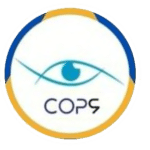Would you like to know how to choose between glasses or contact lenses? Can myopes (short-sighted) and hypermetropes (long-sighted) wear them? At what age can a young person start wearing contacts? So many questions on this subject that the COP9 team of Dr. Zwillinger, ophthalmologist, will answer in this article!

How to choose between glasses or contact lenses?
Whatever your profile, myope, hypermetropic or astigmatic, corrective lenses or eyeglasses will be adapted to your visual disorder. You will have an equally good correction with either one.
The COP9 team recommends that you make an appointment with your ophthalmologist especially for a first adaptation of the lenses. It is also possible to go to a specialized optician’s store after having received a prescription from your ophthalmologist.
This step is crucial since the eye specialist will make sure during your eye exam, with their professional instruments, that your eyes adapt correctly to the lenses.
They will choose the most appropriate type of corrective lens based on the characteristics of your eye, its curvature, its visual acuity and your daily needs.
Ophthalmological checkups are done at the same rate as for glasses, with one appointment per year to renew your prescription and monitor the evolution of your visual disorder.
Wearing corrective lenses requires following strict rules of hygiene and care to keep your eyes healthy. Do you wonder how to clean your lenses? We’ll have an article on this subject for you soon!
At what age can you choose between glasses or contacts lenses?
Children with visual impairments can switch from glasses to contacts from the age of 15. Before that age, COP 9 advises that contact lenses are not recommended by eye care professionals outside of a specific medical setting. Glasses are the most accessible and easiest way to correct visual impairments in children and adolescents.
It is essential to discuss and make the child or teenager understand their commitment and willingness to wear contact lenses. It is necessary to make the child or teenager aware of the strict wearing conditions, the risk of infection (conjunctivitis, etc.), as well as the importance of lens hygiene, with the correct use of cleaning products and cases.
A child under the age of 15 may be required to wear lenses, which is medically justified.
- Less than 3 years old: wearing of lenses limited only to special cases such as cataract operated without implant.
- From 3 to 8 years: adaptation of severe cases of ametropia (myopia, hyperopia, astigmatism).
- From 8 to 15 years old: problems with wearing glasses during sports activities (swimming, etc.) or other reasons.
Beware of undesirable effects of contact lenses!
The COP9 multidisciplinary team would like to draw your attention to the undesirable effects that can be observed in contact lens wearers: discomfort, red eyes, itching, risk of infection, headaches, dry eyes. Careful lens care, avoiding prolonged wear and frequently renewing lenses will protect you from the main inconveniences, as well as wearing glasses alternately.
If one or more of these symptoms apply to you, remove your lenses immediately. We encourage you to make an appointment with your ophthalmologist to get medical advice and have your eyes examined to avoid any infection or eye disease!
In conclusion of this article Glasses or contact lenses?
In conclusion, we encourage you to take the time to test different types of lenses: rigid, soft, monthly, bi-monthly, single use (daily), toric lenses…The more comfortable your lenses are, the less likely you will be subject to these inconveniences!
